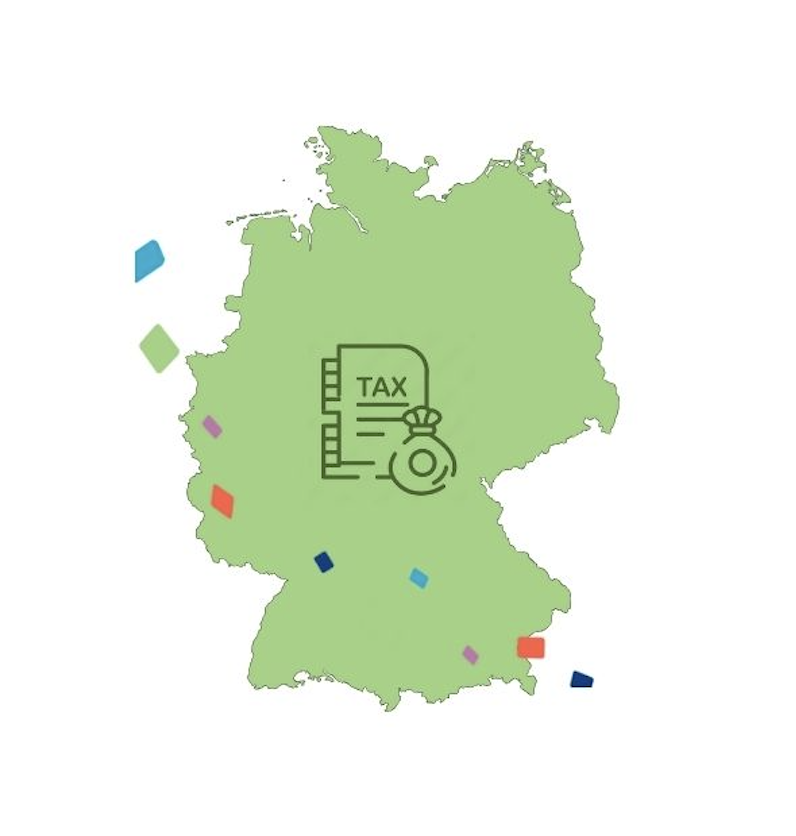Gift And Gift Card Taxation in Germany Simplified


by Signe Hegart
October 25, 2023
If your company operates in Germany and uses gift cards as rewards or incentives for employees, it’s important to understand the taxation rules surrounding them. Gift card taxation can be a complex subject, but we’re here to break it down for you and simplify the process.
Jump to section
Gift Card Taxation in Germany
Your employees in Germany have a lot of options. To keep employee gifts tax-free in Germany, there are a few rules and limits to follow.
Non-Cash Benefits (e.g., Gift Certificates, Subsidies)
Non-cash benefits such as gift certificates and subsidies are tax-free in Germany as long as they do not exceed the monthly limit of €50. This means that employees can receive these non-monetary perks without incurring tax liabilities up to this amount.
Gifts for Personal Occasions (e.g., Anniversaries, Birthdays, Weddings, Birth of a Child)
Gifts given to employees for personal occasions, including company anniversaries, birthdays, weddings, and the birth of a child, are tax-free up to €60 per month. Importantly, if multiple personal occasions occur in the same month, the additional gifts related to those occasions are also tax-free.
Cash Gifts
Cash gifts provided to employees are generally taxable in Germany. This means that if you give cash directly to employees as a gift, it is subject to taxation.
Company Parties
For company parties, you can provide up to €110 per employee tax-free. Additionally, you have the flexibility to offer this benefit twice a year, making it a great way to reward and celebrate with your employees.
Employee Discounts for Own Goods and Services
Your company can grant each employee a tax-free employee discount of up to €1,080 per year for the goods and services your company offers. This can be a valuable perk for employees and encourages them to engage with your company’s products or services.
Inflation Compensation Premium
Currently, you can provide an inflation compensation premium to each employee of up to €3,000 tax-free. This provision is in effect until the 31st of December 2024, allowing you to support your employees during inflationary periods.
Services for Professional Development
Services aimed at enhancing the professional development and employability of your employees are always considered tax-free. This encourages investments in the growth and skill development of your workforce, benefiting both your employees and your company.
Source: German Probate Lawyer
What are gift card taxation laws? ⚖️
Gift card taxation laws refer to the regulations and guidelines surrounding the tax treatment of gift cards in a particular country. These laws determine how gift cards are taxed, who is responsible for paying the taxes, and when these taxes should be paid.
In Germany, gift card taxation laws are governed by the German Income Tax Act (Einkommensteuergesetz) and the Value Added Tax Act (Umsatzsteuergesetz). According to these laws, gift cards are considered as a form of income and are subject to taxation.
When it comes to income tax, the tax liability depends on whether the gift card is provided in the context of an employment relationship or as a gift to individuals. If the gift card is given to an employee as part of their compensation or reward, it is considered as taxable income and needs to be included in their annual income tax return.
For individuals receiving gift cards as a gift, the taxation depends on the value of the gift card. If the value is below €44 per year, it is generally exempt from income tax. However, if the value exceeds €44, it is considered taxable and should be declared in the individual’s income tax return.
In terms of value-added tax (VAT), gift cards are generally subject to VAT at the time of purchase. The person or company purchasing the gift card is responsible for paying the VAT. However, when the gift card is used to purchase goods or services, the VAT is then collected from the final consumer.
Gift Card Taxation in Germany for companies with international employees
When a company based in Germany provides gift cards to employees located in other countries, the taxation rules can become more complex due to international taxation considerations. Here are some key points to consider:

Taxation in the Employee’s Country
Each country has its own tax rules regarding gifts and benefits provided by employers. Gift cards provided to employees in another country may be subject to taxation in that country. The taxation rules can vary widely, and it’s essential to understand the tax laws in each country where your employees are located.

Tax Treaties
Germany may have tax treaties with certain countries to prevent double taxation of income. These treaties can affect the tax treatment of gifts or benefits received by employees working in another country. Tax treaties often have provisions related to employment income and benefits, and they can provide guidance on which country has the primary taxing rights.

Reporting and Compliance
Companies need to ensure compliance with the tax laws and reporting requirements of the foreign country where the employees are located. This may involve registering with the tax authorities in that country, withholding and remitting taxes, and fulfilling reporting obligations.

Documentation
Maintain proper documentation of the gift card distribution, including details such as the names of employees, the value of the cards, and the purpose of the gift. This documentation is crucial for compliance and may be required in case of tax audits.

Legal and Accounting Advice
Given the complexities of international taxation, it’s highly recommended to seek advice from legal and accounting professionals who are well-versed in both German and the relevant foreign country’s tax laws. International tax experts can help navigate the specific tax requirements of each country.

Communication with Employees
Employees should be informed about the tax implications of receiving gift cards, including potential tax liabilities in their country of residence. Clear communication can help employees understand and plan for any tax obligations.
The taxation of gift cards provided by a German company to employees in other countries is highly dependent on the specific circumstances, the countries involved, and any tax treaties in place. To ensure compliance and mitigate potential tax issues, it’s essential to seek professional advice and stay informed about the tax laws and regulations in both Germany and the foreign countries where your employees are located. Additionally, you should consult with your tax advisors to assess the specific situation and potential impacts on your company and employees.
Related: Understanding Gift and Gift Card Taxation In France: A Quick Overview
Why are gift card taxation laws important?
Gift card taxation laws are important for companies using rewards and employee incentives across departments in Germany because they determine how gift cards are taxed and who is responsible for paying the taxes. By understanding these laws, companies can ensure compliance with tax regulations and avoid potential penalties or legal issues. Gift card taxation laws are important for several reasons:
- Revenue Collection: Taxation of gift cards is a way for governments to collect revenue. When individuals or companies purchase gift cards, they are essentially transferring value that may be subject to taxation. This revenue can contribute to government budgets and fund essential public services.
- Fairness: Taxation ensures that the value transferred through gift cards is subject to the same tax laws as other forms of income or transactions. This promotes fairness and prevents potential tax evasion or avoidance.
- Transparency: Clear taxation rules provide transparency and predictability for both consumers and businesses. People know what to expect in terms of the tax implications of buying or using gift cards.
- Preventing Tax Evasion: Without proper taxation, there could be an incentive for individuals or businesses to avoid taxes by using gift cards as a means of transferring wealth or income under the radar of tax authorities. Taxation laws help prevent this.
- Economic Impact: The revenue generated from gift card taxation can have a positive economic impact by supporting government programs, services, and infrastructure projects.
- Legal Compliance: Businesses need to be aware of and comply with gift card taxation laws to avoid legal and financial consequences. Non-compliance can result in penalties, interest charges, or legal action.
Related: Are Gift Cards for Employees Taxable? US Expert Insights
Types of gift cards ????
In Germany, there are two types of gift cards: non-monetary gift cards and monetary gift cards. Non-monetary gift cards can only be used to purchase specific goods or services from a particular merchant. Monetary gift cards, on the other hand, can be redeemed for their face value and used as a form of payment at any merchant that accepts them.

Send yourself a gift card
Motivate employees with gift cards
Providing gift cards to employees can be a motivational and rewarding strategy when done thoughtfully. Here are some ways in which giving gift cards can motivate employees:

Recognition and Appreciation
Gift cards serve as a tangible way to recognize and appreciate an employee’s hard work, dedication, and contributions. When employees feel valued and appreciated, it can boost their morale and motivation.

Personalization
Selecting gift cards tailored to an employee’s preferences or interests demonstrates that you’ve put thought into the gift. This personalization can make the employee feel seen and valued, further motivating them.

Incentive for Achievement
Offering gift cards as a reward for meeting specific goals or achieving milestones can be a powerful incentive. Employees are more likely to be motivated to reach targets when they know there’s a reward awaiting them.
It’s important to remember that while gift cards can be a motivating tool, they are just one element of a broader employee motivation and recognition strategy. For the best results, it’s essential to combine gift cards with other forms of recognition, regular feedback, career development opportunities, and a positive work environment. Additionally, understanding the unique preferences and motivations of individual employees can help tailor the use of gift cards to their specific needs and desires.
Let’s have a chat
Employers responsibilities when providing gift cards to employees
Employers have specific responsibilities when providing gift cards to employees, as these gifts are often considered non-cash rewards and can have tax implications. Here’s an overview of the responsibilities of employers when giving gift cards to their employees:
Tax Reporting:
Employers are typically responsible for accurately reporting the value of the gift cards provided to employees to the tax authorities. This information is needed for income tax purposes and ensures that the employees’ tax liabilities are correctly assessed.
Withholding Income Tax:
In Germany, employers may be required to withhold income tax from the value of the gift cards they distribute to employees. This tax withholding is crucial to ensure that employees pay the appropriate income tax on the non-cash benefit.
Determining Tax-Exempt Amounts:
Employers should be aware of the tax-exempt thresholds and limits that apply to non-cash benefits, including gift cards. For example, certain gift cards given for personal occasions may be tax-free up to specific limits. Employers must determine whether the gift card falls within these exemptions and communicate this to employees.
Record-Keeping:
Employers should maintain records of the gift cards distributed to employees. These records may include the names of recipients, the value of the gift cards, the purpose or occasion for which they were given, and the dates of distribution. These records are essential for tax reporting and compliance.
Communication and Transparency:
Employers should clearly communicate the value and purpose of gift cards to employees. This helps employees understand the tax implications and what to expect in terms of income tax withholding or reporting. Transparency is essential to avoid misunderstandings.
Compliance with Changing Tax Laws:
Employers need to stay informed about any changes in tax laws and regulations related to non-cash benefits, including gift cards. Tax rules can change, so it’s crucial to ensure that the company’s practices remain compliant with the latest tax requirements.
Consulting with Tax Professionals:
In complex cases or when providing substantial non-cash benefits, employers may benefit from consulting with tax professionals who can provide guidance on the best practices for tax compliance and reporting.
Providing Resources and Information:
Employers can support their employees by providing information on the tax implications of gift cards and non-cash benefits. This helps employees understand their own responsibilities and potential tax liabilities.
Read also: How big is the gift card market in Europe? Statistics + Trends
Case studies to illustrate how Gift Card Taxation In Germany works in different scenarios
Case 1: Company Anniversary Celebration
Scenario: A medium-sized company in Germany is celebrating its 10th anniversary and decides to reward its employees with gift cards. They give each employee a €100 gift card to a popular restaurant as part of the celebration.
Gift Card Taxation in Germany: In this case, the gift cards provided to employees are exempt from income tax because the company is celebrating a significant company anniversary. As long as the value of the gift cards doesn’t exceed the exemption limit, they are tax-free. Employees can enjoy the gift cards without worrying about tax implications.
Case 2: Employee of the Month Recognition
Scenario: A small retail business wants to recognize outstanding employees by offering an “Employee of the Month” program. Each month, they provide a €50 gift card to a local spa for the selected employee.
Gift Card Taxation in Germany: The gift cards given to the “Employee of the Month” are considered a non-cash benefit. As of the last update in 2021, they can be tax-free if the total value does not exceed the monthly threshold. Since the gift card value is €50, it falls within the limit, making it tax-free for the employee.
Case 3: Holiday Bonuses
Scenario: A large corporation wants to reward its employees during the holiday season. They provide each employee with a €200 gift card for a popular online shopping platform.
Gift Card Taxation in Germany: Gift cards provided during the holiday season are generally considered a taxable benefit. In this case, the company should report the total value of the gift cards to the tax authorities and withhold the appropriate income tax. Employees should be informed of the tax implications, and the necessary tax withholding should occur.
Case 4: Employee Training and Development
Scenario: A tech company invests in the professional development of its employees by providing them with €1,000 gift cards for online courses related to their work.
Gift Card Taxation in Germany: In this scenario, the company is supporting the professional development of its employees, and the gift cards are considered a tax-free benefit. Services for professional development aimed at improving employees’ employability are generally not subject to income tax. Therefore, employees can use the gift cards for online courses without tax liability.
These case studies demonstrate that gift card taxation in Germany varies based on the purpose, value, and specific circumstances surrounding the gift cards. Understanding the rules and exemptions associated with different scenarios is crucial for employers and employees to navigate gift card taxation effectively. Keep in mind that tax laws and thresholds may change over time, so staying informed and consulting with tax professionals is essential.
Gift Taxation
In Germany, gift taxation, also known as “Schenkungsteuer,” is a tax imposed on the transfer of assets or property by gift. Gift tax in Germany is governed by the Inheritance and Gift Tax Act (Erbschaftsteuer- und Schenkungsteuergesetz).
Here are some key points to understand about gift taxation in Germany:
Tax Exemptions
Germany provides certain exemptions and allowances for gift taxation. The amount exempt from gift tax depends on the relationship between the donor and the recipient.
- For gifts to spouses and registered civil partners: 500,000 euros.
- For gifts to children and stepchildren: 400,000 euros.
- For gifts to grandchildren: 200,000 euros.
- For gifts to other family members and close relatives: 20,000 euros.
- For gifts to unrelated individuals: 20,000 euros.
Tax Rates
The tax rate applied to gifts in excess of the exempted amount depends on the value of the gift and the relationship between the donor and the recipient. Tax rates range from 7% to 50%, with higher rates applying to larger gifts and to gifts to unrelated individuals.
Reporting and Payment
If a gift exceeds the tax-exempt amount, it must be reported to the tax authorities. The recipient and the donor are jointly liable for the gift tax. The tax is typically assessed and paid within three months of the gift.
Valuation of Gifts
The value of the gift is generally determined based on the fair market value of the property or assets at the time of the gift. In the case of real estate, the tax office often assesses the value based on the local land registry.
Annual Exemption
There is also an annual exemption of 20,000 euros per donor for gifts to the same recipient. If the annual exemption is not fully utilized, it can be carried forward for up to five years.
Tips for Gift Card Taxation in Germany
If you’re considering gift card taxation in Germany, whether as an individual or a business, it’s essential to be aware of the rules and guidelines to ensure compliance with German tax laws. Here are some tips to consider:
- Document Gift Card Transactions: Keep detailed records of gift card transactions, including the names of recipients, the value of the cards, and the purpose of the gift. Proper documentation is crucial for tax compliance and audit purposes.
- Tax Deductibility: If you’re a business, remember that the cost of gift cards provided to employees can be tax-deductible as a business expense, subject to certain conditions. Consult with a tax advisor to understand the specific rules and limits.
- Communication: If you’re giving gift cards to employees or individuals, it’s a good practice to inform them about the tax implications. Employees should be aware that the value of the gift card may be considered taxable income.
- Seek Professional Advice: If you’re uncertain about the tax implications of gift cards or have specific questions about your situation, consult with a tax advisor or accountant who is well-versed in German tax laws. They can provide tailored guidance based on your circumstances.
Conclusion
In conclusion, gift card taxation in Germany play a vital role for companies using rewards and incentives across departments. Understanding these laws is essential to ensure compliance with tax regulations and avoid penalties or legal issues. Gift cards are considered taxable income and must be included in the annual income tax return for employees receiving them as part of their compensation. For individuals receiving gift cards as gifts, the value exceeding €44 per year should be declared in their income tax return. Companies purchasing gift cards are responsible for paying VAT at the time of purchase, and VAT is collected from the final consumer when the gift card is used. By staying informed about gift card taxation laws, companies can effectively manage their gift card programs and minimize potential risks associated with taxation.
It’s important to emphasize that individuals and businesses should always seek professional assistance and guidance when dealing with Gift Card Taxation in Germany. The complexities and nuances of tax regulations can have a significant impact on financial decisions, so consulting with tax professionals or legal experts is strongly recommended to ensure compliance and navigate any potential challenges effectively.



Let’s have a chat
FAQ
Employers can provide gift cards as part of incentive or bonus programs, but the value of the gift cards is subject to taxation if it exceeds the tax-free threshold. Employers should be aware of the tax implications and ensure proper tax withholding.
Employees do not need to separately report gift cards on their tax returns. The employer is responsible for reporting and withholding the applicable taxes and contributions.
Gift cards provided to employees are treated as a non-cash benefit, and their value is added to the employee’s gross income for the purpose of calculating income tax and social security contributions. The employer is responsible for withholding these taxes and contributions.
Yes, gift cards given to employees in Germany are generally considered taxable income. They are treated as a form of non-cash benefit (Sachbezug) and are subject to income tax and social security contributions.